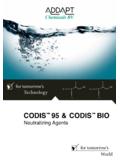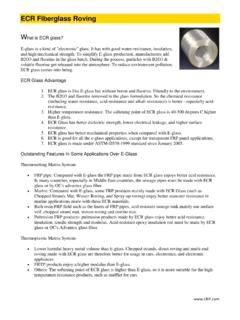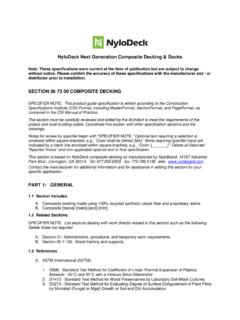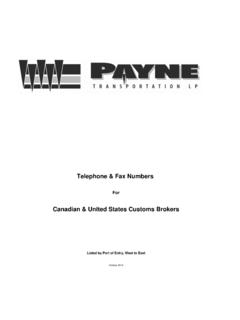Transcription of OCV™ Reinforcements MILLED FIBERS - Owens …
1 CUSTOMER ACCEPTANCE STANDARDS No: TP-31 Date: 04/06/09 Supersedes: 06/24/08 Page 1 of 4 OCV Reinforcements MILLED FIBERS I. DESCRIPTION OCV MILLED FIBERS are engineered Advantex glass filaments that have been hammer MILLED into various specified bulk densities to form powders or floccular masses with specific chemical sizings to maximize end-use performance. II. USE MILLED FIBERS are used as reinforcement and filler medium in plastic composites, adhesives and coatings to enhance mechanical properties, increase modulus, improve dimensional stability and minimize distortion under elevated temperatures.
2 The FIBERS are compatible with thermoplastic materials (including Teflon*) and thermoset materials such as polyester, phenolic, silicones and epoxy. MILLED FIBERS are also compatible with most asphalt, putties, patching cements and other coatings. Product Primary/Recommended Use 731EC Cationic sized glass for reinforcing repair putties, 731ED molding compounds, phenolic, melamine, polyester and epoxy. Also used in thermoplastics. 737BC Silane sized glass for reinforcing a variety of 737BD thermoplastics as well as Reaction Injection Molding (RRIM) compounds.
3 739DC Un-sized** glass for reinforcing fluoropolymers 739DD (PTFE) and other high temperature polymers where organic materials are not desired. * Registered trademark of DuPont Corporation ** 739 products contain no measurable quantity of organic sizing. CUSTOMER ACCEPTANCE STANDARDS No: TP-31 Date: 04/06/09 Supersedes: 06/24/08 Page 2 of 4 III. AVAILABLE PRODUCTS AND THEIR PROPERTIES Screen Moisture Bulk Product** Size* Content Density Color Product Nomenclature (in.) (% max) (gm/cc) (wie) Appearance 731EC 1/32.
4 65 +/- .25 n/a Powdery 731ED 1/32 .55 +/- .10 n/a Floccular 731ED 1/16 .30 +/- .15 n/a Floccular 731ED 1/8 .17 +/- .05 n/a Floccular 737BC 1/64 +/- .20 n/a Powdery 737BD 1/32 .60 +/- .20 n/a Floccular 737BD 1/16 .45 +/- .15 n/a Floccular 739DC** 1/32 min. 56 +/- 14 Powdery 739DD 1/32 .80 +/- .20 56 +/- 14 Floccular 739DD 1/16 .50 +/- .20 56 +/- 14 Floccular * Screen size references the hole diameter of the hammer mill screens and not the actual fiber lengths.
5 The distribution of fiber lengths, and thus the bulk density, is controlled by the screen size. ** Nominal fiber diameter for all products listed is +/- 2 microns. Fiber diameters are controlled during the intermediate fiber forming step through process control. Actual fiber diameters are regularly audited per OCV Test Method D-02 Ce. ** For 739DC, Long FIBERS will not exceed 1% per OCV Test Method W-12 B-T. IV. OCV TEST METHODS (copies available upon request) A. Bulk Density* W-02Ca B. Moisture* W-05Gc C. Color L03A D. Long FIBERS W-12B-T (Tyler 200 mesh @ 5 min. cycle) E. Filament Diameter D-02Ce * Certificate of Analysis data available upon request for these properties.
6 CUSTOMER ACCEPTANCE STANDARDS No: TP-31 Date: 04/06/09 Supersedes: 06/24/08 Page 3 of 4 V. VISUAL CHARACTERISTICS Visual characteristics are defined as those characteristics which are visible to the unaided eye. Individual containers shall be free of the following: A. Contamination by dirt, oil, grease, etc. B. Foreign matter such as wood, packaging materials, etc. C. Hard lumps of nodulated FIBERS D. Loose or tangled lengths of unmilled FIBERS E. Discolored glass (glass should be off-white in appearance). Note: The milling of glass FIBERS is an abrasive process. This process can generate small metallic particles.
7 Although a number of powerful magnets are used at various locations in the process to remove metal, OCV cannot guarantee that the product is 100% metal free. VI. PREPARATION FOR SHIPMENT A. Packaging 1. The products shall be packed in containers of sufficient strength to ensure adequate protection in transit and stores. 2. Products are packed as follows: Packaging Type Weight (Tolerance) Kraft Bags* 50 lb / 23 kg (+ lbs) Gaylord Cartons 700-2000 lb /318-909 kg (10/-0 lbs) Fiberboard Drums 75-254 lb /34-115 kg (+ lbs) * All products packed in Kraft bags are 50 lb /23 kg except 731 ED 1/8 which is packed in 30 lb /14 kg bags.
8 NOTE: All Kraft bags have poly liners. Poly bags are available with bulk cartons and fiberboard drums when specifically requested. The nominal weight of MILLED FIBERS in a carton or drum is dependent on the targeted bulk density of the product. CUSTOMER ACCEPTANCE STANDARDS No: TP-31 Date: 04/06/09 Supersedes: 06/24/08 Page 4 of 4 VI. PREPARATION FOR SHIPMENT - cont d B. Identification The product shall be adequately identified by a content label. C. Storage Conditions MILLED FIBERS must be stored indoors in a dry location. The product should remain in its original packaging, preferably closed, until just prior to use.
9 When stored properly, there is no known shelf life to the product however retesting is advised after three years from initial production date. Note: If the storage temperature is less than 50 F (15 C), it would be advisable to place the pallets in the processing area for a minimum of 24 hours before us to avoid condensation. D. Additional Suggested Best Practices It is recommended for 739DC 1/32 powdery MILLED fiber that the product be screened and heat treated prior to use in PTFE to insure good dispersion and compound color. Exposure to heat, moisture, humidity and pressure during storage and transportation can cause this product to agglomerate in the packaging.
10 Any trace quantity of organics on the glass can cause the formation of carbon deposits when exposed to the processing temperatures of PTFE in an oxygen starved environment. More detail available upon request. VII. SPECIAL PRECAUTIONARY NOTE In the event that Owens Corning or the customer has reason to suspect that shipment may contain out of spec material, the party first suspecting such condition will notify the other, and Owens Corning will assume responsibility for initiating appropriate action. The use of the suspect material should be is continued pending an investigation of the facts.





